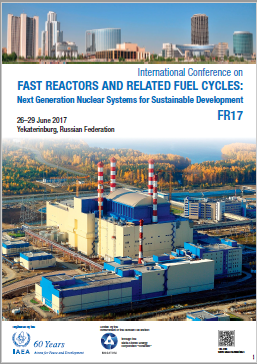Speaker
Dr
JAEWOON YOO
(Korea Atomic Energy Research Institute)
Description
Korea Atomic Energy Research Institute (KAERI) is developing Prototype Generation-IV SFR (PGSFR). The first design stage has been completed at the end of 2015 and the preliminary safety information document (PSID) has been issued as a main outcome of the phase. The safety design approach of PGSFR is compliance of defense-in-depth and to enhance the inherent and passive safety design features of a metal fuel and pool type sodium system. Additional design measures against the severe accident mitigation has been implemented into the PGSFR design. Inherent reactivity feedback resulting from the metal fuel properties plays a positive role during design basis accidents and design extension conditions, which is basic mechanism to prevent the severe accident as well as the fully passive safety grade decay heat removal systems. The ex-vessel cooling and self-actuated shutdown system provides additional design margin against severe accident propagation toward the goal of molten-fuel in-vessel retention. The compliance of PGSFR with Generation-IV SDC will be explained in more details during panel discussion.
Country/Int. Organization
Korea Atomic Energy Research Institute, Republic of Korea
Author
Dr
JAEWOON YOO
(Korea Atomic Energy Research Institute)
Co-authors
Dr
JINWOOK CHANG
(Korea Atomic Energy Research Institute)
Dr
TAE-HO LEE
(Korea Atomic Energy Research Institute)

